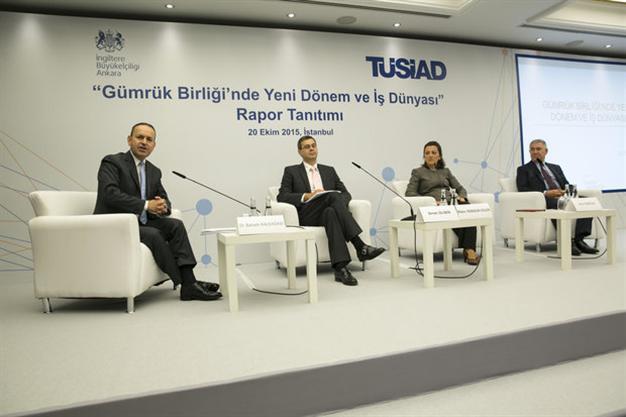Deepening Customs Union with EU will ‘create new narrative for Turkish economy’
Güneş Kömürcüler - ISTANBUL
 Deepening the current Customs Union deal between Turkey and the EU will enable the country to develop a new economic narrative, according to Sinan Ülgen, the founder of Istanbul Economics and a visiting scholar at Carnegie Europe in Brussels.
Deepening the current Customs Union deal between Turkey and the EU will enable the country to develop a new economic narrative, according to Sinan Ülgen, the founder of Istanbul Economics and a visiting scholar at Carnegie Europe in Brussels.“The current Customs Union deal which has been in force between Turkey and the European Union since 1995, covers only industrial goods and processed agricultural goods, amounting to only 20 percent of the national economy. With a deepening of the Customs Union deal, services industries and the agricultural sector could be included as well as public procurement, thus incorporating all areas of the Turkish economy related to international trade,” said Ülgen at a press meeting on Oct. 20 to launch a working report prepared by Istanbul Economics as a part of a Turkish Industry and Business Association (TÜSİAD) project financially supported by the British Embassy in Ankara.
“On the road to deepening its deal with the EU, Turkey will have many opportunities to liberalize its economy and raise its economic activities to become more transparent and more productive. This deal will definitely enable the country to create a new economic narrative, which it needs now,” said Ülgen, who is also the chairman of the Istanbul-based Center for Economics and Foreign Policy Studies (EDAM).
The report, which is co-authored by Ülgen and Pelin Yenigün Dilek, a senior consultant in Istanbul Economics, has analyzed what the deepening in the Customs Union will bring to the Turkish economy.
Following a political understanding announced in May 2015, Turkey and the EU officially initiated the process.
Ülgen said formal negotiations are expected to be launched by the second half of 2016.
Turkey’s share in the EU’s economy is around 2 percent, but the latter’s share in the Turkish economy is very large, making the deal of crucial importance for the country.
“Turkey will start to see the benefits of deepening the Customs Union deal as soon as the planned negotiations begin in terms of recovering its current account deficit or increasing its tourism figures. The medium and long-term positive effects will be huge,” TÜSİAD International Coordinator Bahadır Kaleağası told HDN.
Report recommends a hybrid model in harmonization
Deepening the Customs Union will also create advantages for Turkey on the road to achieving full membership of the EU, Kaleağası noted.
The report stated that deepening the deal will help Turkey enhance its economic governance by bringing about a convergence of Turkey’s economic legislation and regulatory framework and shaping Turkey’s business and investment climate with the EU, according to the report.
The new deal will also make it necessary for Turkey to introduce a more transparent public procurement system and financial support system, it added.
The report said the deal will also encompass a strengthened mechanism for the settlement of disputes and strengthen Turkey’s independent regulatory institutions, such as the banking watchdog BDDK or the energy watchdog EPDK.
“But despite its manifold advantages, the model of full regulatory harmonization has a significant drawback for a country with an important state tradition and an experience of being for more than 70 years a multi-party democracy. Accepting a commitment for the full adoption of the EU without being an EU member is tantamount to agreeing to implement this acquis devoid of the ability to contribute to its shaping,” the report also warned.
It said the consequence of this will be to create a situation of “policy dependency” in all areas covered by the deepened Customs Union and will lead to the transfer of sovereignty to an institution to which Turkey is not a member.
“This situation also has consequences for Turkey’s democracy as Turkish lawmakers will be devoid of the possibility to properly legislate on policies covered by the Customs Union. The role of the Turkish Parliament will be limited to adopting harmonization laws for compliance with the Single Market legislation. Negotiations should strive to find novel ways to address this conundrum and enhance provisions for better institutional cooperation. Yet no overarching and fully satisfactory solution will be found in the absence of Turkey’s EU membership. Consequently a careful and detailed assessment is needed before deciding on the specific model to be adopted for regulatory harmonization. Despite the advantages of full market access, faster progress in membership talks and facilitation of Transatlantic Trade and Investment Partnership (TTIP) membership, a model of full regulatory harmonization is not recommended. In its stead, a more flexible and hybrid approach should be prioritized,” stated the report.
















